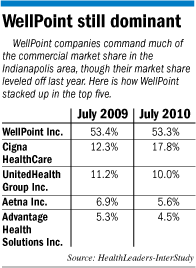Subscriber Benefit
As a subscriber you can listen to articles at work, in the car, or while you work out. Subscribe NowAnthem Blue Cross and Blue Shield’s share of the Indianapolis area has leveled off, even though it still insures more than half the commercial market—or three times as much as its nearest competitor.
The Indianapolis-based company claimed 53.3 percent of local people covered by private insurance in 2010, virtually the same amount it insured the previous year, according to data from HealthLeaders-InterStudy, a Tennessee-based market research firm.
 While Anthem’s share of its hometown market has stayed the same, at least for one year, its closest rival, Philadelphia-based Cigna Corp., gained the most traction. Its portion of the local commercial market climbed from 12.3 percent to 17.8 percent—a whopping increase of 5.5 points.
While Anthem’s share of its hometown market has stayed the same, at least for one year, its closest rival, Philadelphia-based Cigna Corp., gained the most traction. Its portion of the local commercial market climbed from 12.3 percent to 17.8 percent—a whopping increase of 5.5 points.
The next-largest insurer in the metro area, Minnesota-based UnitedHealth Group Inc., slipped from 11.2 percent to 10 percent.
Trailing the three are Connecticut-based Aetna Inc. (5.6 percent), Indianapolis-based Advantage Health Solutions Inc. (4.5 percent), Illinois-based Health Care Service Corp. (2.7 percent), Kentucky-based Humana Inc. (2.1 percent), and Columbus, Ind.-based Southeastern Indiana Health Organization (1.3 percent).
Sue Podbielski, president of Cigna’s Midwest market, attributed the growth in part to a wellness program it offers employers that includes proprietary access to the University of Michigan’s risk assessment system.
From employee surveys, the system predicts with an 83-percent accuracy rate who will have an acute illness within three years, Podbielski said.
Cigna is widely recognized within the insurance industry as one of the most innovative and aggressive when it comes to wellness programs.
Podbielski also pointed to Cigna’s recognition of Indianapolis as a “growth market” for the insurer, despite Anthem’s dominant status.
“We’re selling Cigna; we’re not selling against Anthem or [parent company] WellPoint,” she said. “That is our strategy … and we don’t worry about what other people are doing. I don’t mean to sound cavalier, but we drink our Kool-Aid.”
Some insurers, though, question the study’s accuracy. Even market leader Anthem argued that its share cited by the research firm is, oddly, too high.
“That number seems inflated to us,” Anthem spokesman Tony Felts said. “It’s higher than anything we’ve ever seen.”
Anthem counts people insured by individual or workplace policies as well as people covered under Medicare and Medicaid plans contracted through the state. By that broader measure, Anthem’s market share comes to 46.9 percent—still more than three times higher than Cigna’s total share.
Felts maintained the smaller percentage is more accurate of Anthem’s true share, but declined to be more specific, saying, “We would be tipping our hands to our competitors.”
While it’s clear Anthem remains the market leader no matter how the numbers are calculated, one competitor takes issue with Cigna’s placement as the second-leading provider.
Dan Krajnovich, CEO of UnitedHealth Indiana, said his company’s market share in Indianapolis did not shrink the past year but remained mostly flat. Still, judging from its own numbers, he estimated UnitedHealth’s share to be 12 percent instead of the 10 percent the study indicates.
“We’ve been a clear No. 2 ahead of Cigna for quite some time,” Krajnovich insisted.
Sheri Alexander, senior vice president of employee benefits at Indianapolis brokerage Gregory & Appel Insurance, supports his argument.
“That just surprises me,” Alexander said of Cigna’s ranking ahead of UnitedHealth. The rank is particularly surprising considering she’s placed more new business with UnitedHealth than even with Anthem.
The top reason: United’s purchase in 2005 of third-party administrator URM, which enables it to better compete in the large-employer market, where companies tend to be self-funded. Third-party administrators often are used to pay claims and URM has given UnitedHealth better access to the large market.
Meanwhile, Congress passed sweeping health insurance reforms last year in part because of perceptions of insufficient competition and choice in the health insurance market.
Insurers are leaving the Indianapolis market.
Des Moines, Iowa-based Principal Financial Group Inc. announced in October it is exiting the health insurance business. Layoffs of 60 Indianapolis workers were scheduled to begin in December and continue for two to three years.
And Humana effectively has stopped quoting new health insurance rates locally, instead opting to focus efforts on its growing dental, life, workplace voluntary and critical illness lines of business, company spokesman Jeff Blunt said.
Alexander said Gregory & Appel has placed a good chunk of business in the small-group category—employers with fewer than 100 workers—with not only UnitedHealth but a smaller competitor as well, Advantage Health Solutions.
Still, Anthem offers the most competitive rates because of the discounts it’s forged for medical services with hospitals and physician groups, Alexander said.
“It’s just really tough to compete in Indianapolis with Anthem,” she noted.
It may be difficult, but it’s possible, said Rebecca Waller, senior health plan data analyst at HealthLeaders-InterStudy.
Enough companies have a noticeable presence in Indianapolis to influence the market, she said, specifically mentioning CIGNA and UnitedHealth.•
Please enable JavaScript to view this content.
